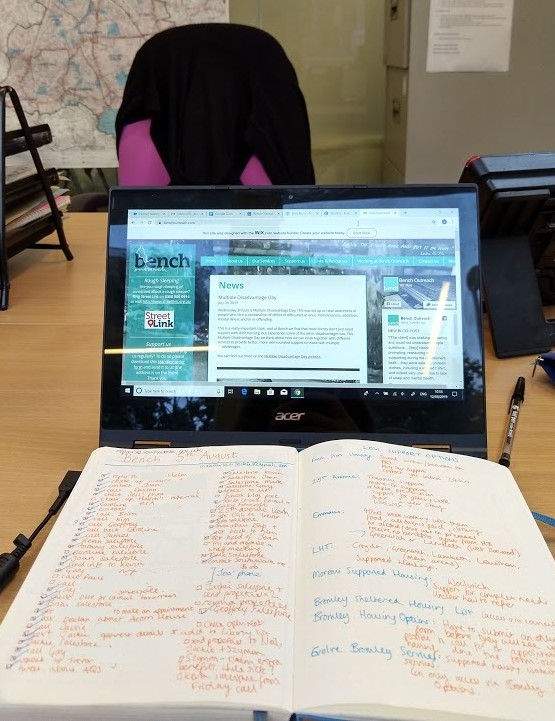A brief insight into what kinds of problems are faced by homeless or vulnerably housed clients- this article describes what a typical (part-time) week might look like for a housing and benefits adviser at Bench Outreach. (Precise details changed to protect clients).
MONDAY
Monday morning is for chasing people up. I’ve got a heck of a to-do-list and several calls to make. I’ve made applications for three different clients to supported housing projects, but haven’t heard anything back for a over a month.
I find out that they are all still on the waiting list; I call each of them to explain. They are upset because they have been sleeping rough for long periods of time, but as they are not considered to be in priority need by the council, this is their best option to be housed. I feel uneasy as I end the calls, clients accepting they will just have to make do sleeping outside or in the night shelter for even longer.
In the afternoon, I hold a drop-in clinic at a local community centre in the poorest estate in Deptford. It’s noisy- there’s a children’s holiday club going on in the same room. We huddle in a corner and try and bash out a few benefits problems and social housing applications. Some clients are angry because, although they are overcrowded and need to move their families into a better council house, they have been waiting for well over a year. The council does not have enough properties and simply can’t help people quickly enough.
TUESDAY
I have several appointments booked today. The first one does not show up; often clients cannot attend if they are too sick, cannot afford travel, or simply have lives too hectic to manage. They may not be able to contact me if they don’t have a phone. Some are simply too anxious or depressed to attend.
Someone drops into Bench in a very emotional state because he has received a letter from the DWP about his benefits, but he is illiterate so he does not understand it. The letter says his ESA has been stopped- we think this is an administrative error and spend an hour on the phone waiting on hold, before being told it was just a mistake. No apology. This client has gone without money for a couple of weeks now and is behind on bills as a result. We make a plan together to pay the outstanding bills, and I manage to calm him down.
My next client has been issued a notice of seeking possession for a Section 21 eviction: a “no fault eviction”. She has lived in this flat for 11 years. She has built up a small amount of arrears because her rent has gone up beyond what housing benefits will cover, and she’s been £10 a week short for a few months. The landlord wants their money; I call them to negotiate, but they are adamant they will be evicting this client. The client is terrified and clearly badly affected already by this instability. I tell her I will update her with viewings of different properties nearby when I hear about them. This client does not know how to use a computer at all, so looking online independently is impossible.
Some good news! A client has engaged with mental health services to try and get help for their psychological problems. They have also agreed to get help with their alcohol dependence. This is great- it can be an extremely daunting thing for vulnerable adults to reach out when they need help. Hopefully this is the beginning of more independence, happiness, and health for this client.

WEDNESDAY
This morning I’m running a housing advice drop-in at a local drug and alcohol support clinic. When I arrive, there are already three people waiting. The first feels unsafe in their rented flat because violent drug-dealers are looking for them. They are not eligible for help from the council because if they leave the property, they become ‘voluntarily homeless.’ The client has called the police, but has not been taken seriously due to their prolonged history of drug use and precarious mental health.
Another client is in her sixties, and is feeling domestic violence. I refer her to a local refuge who will arrange a safe time for her to escape. Her family no longer want her around because of her drug problem. She began using partly due to the strain of this abusive relationship, and tells me she is fed up and has thought of ending it all. I offer to call an ambulance if she is feeling suicidal; she declines and gratefully agrees to the refuge option.
In the afternoon I attend the Lewisham Homelessness Forum- there are around 30 different charity workers, council homeless prevention workers, and DWP employees who have come together to discuss how we can target certain problems and update each other on our work in the borough. It’s uplifting to see so many different organisations all working together to help vulnerable people. We discuss issues like modern slavery awareness, how we can contact the government to make larger-scale changes, and how organisations can support each other if they need help.
The forum is also a wake-up call. We discuss the tragic deaths of 2 rough sleepers in the borough. It’s crucial to keep talking about homelessness and why it is ruining and ending people’s lives.
As our advice workers all work for Bench part-time, a three day week has been used for this article.
MORE INFO:
If you want to find out more about our services, head over to benchoutreach.com or email us at declan@benchoutreach.com. If you’re looking for housing and benefits advice, give us a call on 020 8694 7740.
You can also follow us on twitter @benchoutreach or like us on Facebook as Bench Outreach. Give this article a share if you want to help spread the word about the problems faced by homeless people.
If you’re as fed up as we are with the problems that this particularly vulnerable group of people faces, you can write to your MP. You can find out who your MP and their email address here. If you’d like to use our template letter, you can find it here and copy it into the email to your MP. It’s a really simple way of raising your voice and getting these crucial problems talked about. We need to work together if we want to tackle this problem and save lives.




